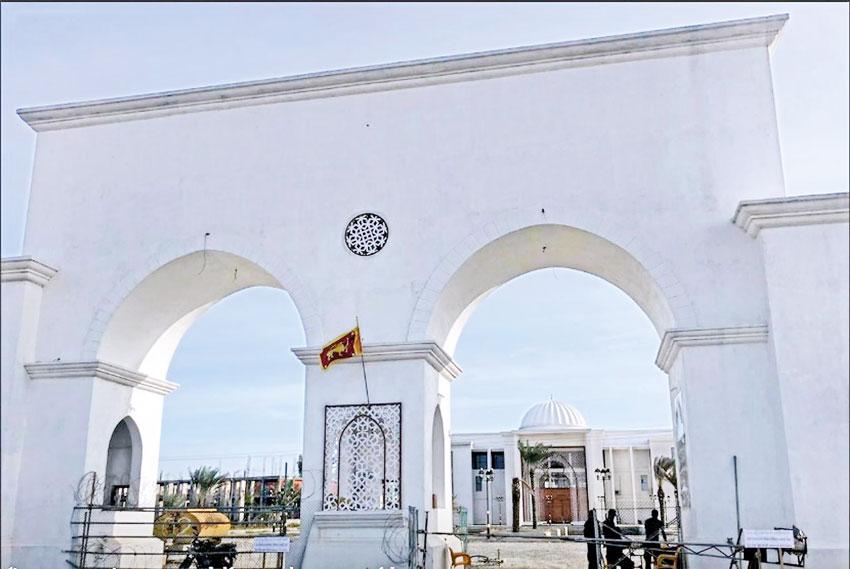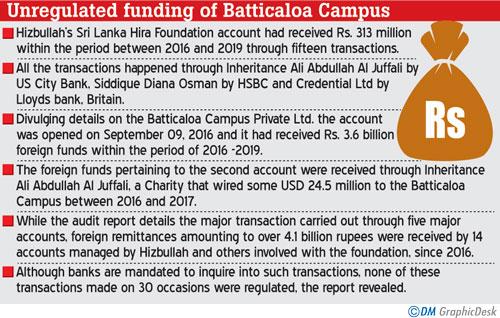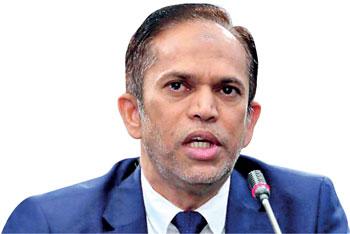03 Dec 2020 - {{hitsCtrl.values.hits}}

The BoI had issued tax release certificates amounting to Rs.48.5 million on 143 occasions
In addition to the 35 acres granted by the Mahaweli Authority, a further nine acres acquired by the Hira Foundation illegally
BOC had not reported details pertaining to transactions as mandated by Central Bank
When branch reported the activities as suspicious, BOC head office said it did not find these transactions to be suspicious
 Following last week’s announcement by Education Minister G.L. Peiris in Parliament on the Government’s decision to acquire the controversial Batticaloa Campus, the Auditor General had informed and issued certain directives to the Attorney General’s Department regarding the campus.
Following last week’s announcement by Education Minister G.L. Peiris in Parliament on the Government’s decision to acquire the controversial Batticaloa Campus, the Auditor General had informed and issued certain directives to the Attorney General’s Department regarding the campus.
The special audit report submitted last week, by the Auditor General W.P.C. Wickremaratne to the Attorney General’s (AG) Department, recommended that appropriate legal action be taken against officials of the well-known state finance entity, Bank of Ceylon (BoC) and the Mahaweli Authority. Both institutions were found to have flouted standard procedure, during the construction of the Batticaloa Campus. According to the audit report, massive irregularities had taken place since the inception of the project.
The sprawling Batticaloa campus came into focus, in the aftermath of the 2019 Easter Sunday terror attacks. The involvement of former Eastern Province governor and former Deputy Minister M.A.L.M. Hizbullah, who was embroiled in a controversy at the time, attracted the public’s ire, following a number of allegations including financial irregularities and the forcible acquisition of land. Mr. Hizbullah is also the Chairman of the Batticaloa Campus.

The report said all activities conducted by the former Eastern Province Governor and the officials who assisted him when registering the Hira Foundation -- a unit which identifies itself as a social service organisation owned by Mr. Hizbullah – the lease of a block of land from Mahaweli Authority to the University of Batticaloa, opening of bank accounts and conducting of degree courses had been carried out in an illegal manner.
The Hira Foundation chaired by Mr. Hizbullah, as the foundation’s first initiative decided to setup a vocational training center named University College of Batticaloa in 2013. The report mentioned that he had used his Parliamentary seat and his Deputy Ministerial post to conduct the work at Hira Foundation.
The audit report reveals that the application submitted by the Hira Foundation to start a vocational training institute was approved by the then Minister of Youth Affairs and Skills Development Dullas Alahapperuma on May 2, 2013. This approval has been granted despite the rejection of the proposal by the Director General of the Vocational Education Commission citing that the required qualifications for the
project were not met.
The Ministry had also entered into a three-year Memorandum of Understanding (MoU) with the Hira Foundation, as a tripartite agreement with the Vice Chancellor of the Technical University. The University of Batticaloa was officially opened on May 13, 2014, despite the Secretary to the Ministry not approving the course, which charged Rs.216,000 per student. It was found that the Batticaloa University did not complete the required basic qualifications to continue as a vocational training institution.
ILLEGAL LAND ACQUISITION
The audit report also states that the 35-acre land granted by the Mahaweli Authority for the construction of the university is a paddy land which was described differently. The report also states that the land, which was earlier to be given on a long-term lease basis for 30 years, has been given on an annual license basis. The audit also pointed out that granting permission for permanent construction on land acquired on an annual lease basis is also illegal.
Meanwhile, during the proceedings conducted by Presidential Commission of Inquiry (PCoI) probing the Easter Sunday attacks it was revealed that former Governor M.L.A.M. Hizbullah produced a forged registration document for the Hira Foundation, as a document issued by the Social Services Department to purchase the land in which the campus was established.
Testifying before the Commission, Director-Lands attached to the Mahaweli Authority, Asanka Udaya Kumara said Mr. Hizbullah made the request on March 15, 2012 to obtain the land to construct the campus. He said the request letter to obtain the land had been sent to the then subject Minister Nimal Siripala de Silva.
“Former Governor Hizbullah used Hira Foundation’s registration certificate to obtain the land to construct the Batticaloa Campus, which was later found to be a fake document,” he said.
The witness also said according to the initial request made to the then Minister, Hizbullah was for an allocation of 25 acres of land. It was also revealed that in the request letter it was mentioned that a Saudi Arabian Vocational Training service was willing to grant funds to construct the training centre in Batticaloa. The witness further said though the Hira Foundation had requested a 25-acre plot of land, in their application to the Mahaweli Authority, the foundation indicated 35-acres of land. The Authority at the time had considered the request.
“However, in addition to the 35 acres granted by the Mahaweli Authority to the Hira Foundation, a further nine acres were acquired by the foundation illegally,” the witness said. Three cases have been filed against the foundation at Valaichchenai Magistrate’s Court regarding the illegal land acquisition.
BOARD OF INVESTMENT IN LIMBO
The Board of Investment (BoI) of Sri Lanka entered into an agreement with the Batticaloa Campus Limited on May 19, 2016, recognizing the construction of the University as a BoI project.
When registering it as a BoI project, typical requirements such as, long term lease deed for the land, the survey plan of the proposed site, the building plan with the approval of the local council and the letter of consent by the land owner, were not submitted. However, it was found that the BoI had provided tax releases amounting to Rs. 48.5 million on 143 occasions.
BOC FAILED TO MONITOR IRREGULARITIES
The audit report pointed out that transactions worth billions of rupees were conducted through four bank accounts at the Bank of Ceylon (BoC) which were not reported to the Central Bank.
According to what transpired during the deliberations of the PCoI on the Easter Sunday attacks, two Bank of Ceylon (BoC) accounts operated by former Eastern Province Governor M.L.A.M. Hizbullah had received more than Rs.4 billion in foreign funds within a period of three years, before the Easter Sunday terror attacks,.
Testifying before the Commission, former BOC Kollupitiya Branch Manager I.C.K. Kannangara informed the Commission that Mr. Hizbullah had operated five accounts at the Kollupitiya branch.
However, evidence had been led before the Commission with regard to two accounts named Sri Lanka Hira Foundation and Batticaloa Campus Private Ltd, out of five accounts operated by Mr. Hizbullah.
“The two accounts were current accounts. Sri Lanka Hira Foundation account had received foreign funds on fifteen occasions and Batticaloa Campus Private Ltd. The account had also received foreign funds on seven occasions during the period between 2016 and 2019,” the witness said.
According to the Financial Transaction Regulation Act (FTRA) in Central Bank, transactions in a single account receiving more than one million, have to be reported to Central Bank.
However, during the testimony it was informed to the Commission that BOC had never reported details pertaining to transactions involving such large sums operated by Hizbullah, to the Central Bank.
“Customer service managers at the BOC Colpetty Branch had informed that these funds were suspicious and it had been reported to the Compliance Division of BOC Head Office. However, the head office had reported that they didn’t find these transactions were suspicious,” the witness said.
However, following the Easter Sunday terror attack, the bank had reported to Central Bank that these transactions were suspicious and accordingly the Central Bank had made a complaint before the Financial Investigation Unit (FIU).
According to the details mentioned in the documents, Hizbullah’s Sri Lanka Hira Foundation account had received Rs. 313 million within the period between 2016 and 2019 through fifteen transactions. “All the transactions happened through Inheritance Ali Abdullah Al Juffali by US City Bank, Siddique Diana Osman by HSBC and Credential Ltd by Lloyds bank, Britain,” the witness said.
Divulging details on the Batticaloa Campus Private Ltd. the witness informed the Commission that the account was opened on September 09, 2016 and it had received Rs. 3.6 billion foreign funds within the period of 2016 -2019.
It was also informed to the Commission that the foreign funds pertaining to the second account were received through Inheritance Ali Abdullah Al Juffali, a Charity that wired some USD 24.5 million to the Batticaloa Campus between 2016 and 2017.
While the audit report details the major transaction carried out through five major accounts, foreign remittances amounting to over 4.1 billion rupees were received by 14 accounts managed by Hizbullah and others involved with the foundation, since 2016. Although banks are mandated to inquire into such transactions, none of these transactions made on 30 occasions were regulated, the report revealed.
27 Nov 2024 6 minute ago
27 Nov 2024 36 minute ago
27 Nov 2024 52 minute ago
27 Nov 2024 2 hours ago
27 Nov 2024 3 hours ago